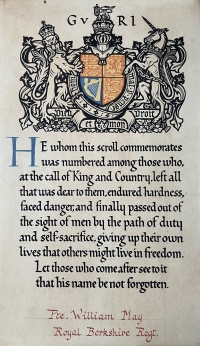
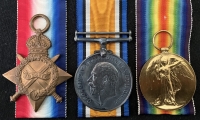
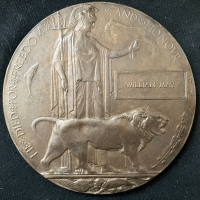
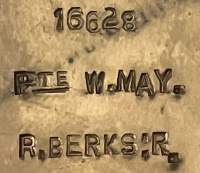

A Rare & Totally Complete
FIRST DAY, BATTLE OF THE SOMME,
1914-15 Trio, Memorial Plaque & Scroll.
To:
16628, Pte. W. MAY,
2nd Royal Berkshire Regt.
KILLED IN ACTION,
(Ovillers-la-Boiselle)
1st JULY 1916.
Age 31.
 William May was the Son of Henry and Mary Ann May & Husband of Mary Ann May, of 22, Spring Grove, Reading. The address still exists.
At the outbreak of war in August 1914 the regular 2nd Battalion of Royal Berkshires was in Jhansi, India, and returned to England, landing on 22nd October 1914 when they moved to Winchester and were placed under command of 25th Brigade in 8th Division.
The unit then shipped to France and landed at Le Havre on 5th November 1914. William May was born in 1885 and joined 2nd Berks Regt as a Kitchener’s volunteer at age 29 in the early months of the war and after his initial training joined the newly returned regulars of 2nd Bn in France in the summer period of 1915.
William May was the Son of Henry and Mary Ann May & Husband of Mary Ann May, of 22, Spring Grove, Reading. The address still exists.
At the outbreak of war in August 1914 the regular 2nd Battalion of Royal Berkshires was in Jhansi, India, and returned to England, landing on 22nd October 1914 when they moved to Winchester and were placed under command of 25th Brigade in 8th Division.
The unit then shipped to France and landed at Le Havre on 5th November 1914. William May was born in 1885 and joined 2nd Berks Regt as a Kitchener’s volunteer at age 29 in the early months of the war and after his initial training joined the newly returned regulars of 2nd Bn in France in the summer period of 1915.
 [2nd Bn BERKSHIRE REGIMENT on 1st JULY 1916]
-The First Day of The Battle of The Somme-
(Ovillers-la-Boiselle)
On Saturday 1st July 1916 the 2nd Battalion found themselves in a trench near the French town of Albert.
At 7:30am three companies of the battalion left the trench to advance on German held positions a few hundred metres away around the little village of Ovillers-la-Boiselle - the Battle of the Somme had begun.
The German positions to be attacked were in front of the village of Ovillers, which was just off the northern side of the Albert to Bapaume road, which is just a stones throw across the road from La Boiselle itself.
At 7:28 a.m. the Royal Engineers detonated their four mines at La Boisselle, the two largest being the one at Y-Sap and the now famous Lochnagar crater mine. No less than 15 other mines were fired along other sectors of the front line. The explosion of the Lochnagar mine obliterated 300–400 feet of German fortifications, including nine dug-outs and apparently vaporised several hundred men inside them as there were few remains.
Most of the 5th Company of Reserve Infantry Regiment 110 and the trenches nearby were destroyed. The Lochnagar mine lay on the sector assaulted by the Grimsby Chums, 10th Battalion, The Lincolnshire Regiment.
[2nd Bn BERKSHIRE REGIMENT on 1st JULY 1916]
-The First Day of The Battle of The Somme-
(Ovillers-la-Boiselle)
On Saturday 1st July 1916 the 2nd Battalion found themselves in a trench near the French town of Albert.
At 7:30am three companies of the battalion left the trench to advance on German held positions a few hundred metres away around the little village of Ovillers-la-Boiselle - the Battle of the Somme had begun.
The German positions to be attacked were in front of the village of Ovillers, which was just off the northern side of the Albert to Bapaume road, which is just a stones throw across the road from La Boiselle itself.
At 7:28 a.m. the Royal Engineers detonated their four mines at La Boisselle, the two largest being the one at Y-Sap and the now famous Lochnagar crater mine. No less than 15 other mines were fired along other sectors of the front line. The explosion of the Lochnagar mine obliterated 300–400 feet of German fortifications, including nine dug-outs and apparently vaporised several hundred men inside them as there were few remains.
Most of the 5th Company of Reserve Infantry Regiment 110 and the trenches nearby were destroyed. The Lochnagar mine lay on the sector assaulted by the Grimsby Chums, 10th Battalion, The Lincolnshire Regiment.
 The main attack began at Zero Hour, 07:30am on the Saturday morning, but being so very close to the Lochnagar mine explosion site, (*less than 250 yards across away across no man’s land and what was and is now again a potato field.) the Grimsby Chums were delayed. This delay was for just a few minutes in order to let the huge amount of expelled soil & chalk debris from the massive explosion to settle.
Some of The Chums didn’t make it much further than a few yards from their trench before being savagely cut down by enfilading machine gun & rifle fire in no man’s land, ….but a few of the lads managed to occupy positions on the newly formed rim of the crater and began to fortify its eastern lip. This position dominated the vicinity and the Chum’s advance continued to the Grüne Stellung (second position), where it was stopped by the German 4th Company, which then counter-attacked and forced the British men back to the crater.
[NOTE]
My own great uncle 1107 Pte John William Camplin of 10th Lincoln’s, The Grimsby Chums, was Killed in Action at La Boisselle on 1st July 1916 and was seen shot dead with his best mate Pte Harold Cammack by the telegraphic linesmen as they rolled out the new phone cables. They were both laying right by the lip of the crater.
Their bodies were never recovered and both are commemorated on the THIEPVAL Memorial to the missing of The Somme.
My Great Uncle John was just 21 and from Sleaford, Lincolnshire.
The main attack began at Zero Hour, 07:30am on the Saturday morning, but being so very close to the Lochnagar mine explosion site, (*less than 250 yards across away across no man’s land and what was and is now again a potato field.) the Grimsby Chums were delayed. This delay was for just a few minutes in order to let the huge amount of expelled soil & chalk debris from the massive explosion to settle.
Some of The Chums didn’t make it much further than a few yards from their trench before being savagely cut down by enfilading machine gun & rifle fire in no man’s land, ….but a few of the lads managed to occupy positions on the newly formed rim of the crater and began to fortify its eastern lip. This position dominated the vicinity and the Chum’s advance continued to the Grüne Stellung (second position), where it was stopped by the German 4th Company, which then counter-attacked and forced the British men back to the crater.
[NOTE]
My own great uncle 1107 Pte John William Camplin of 10th Lincoln’s, The Grimsby Chums, was Killed in Action at La Boisselle on 1st July 1916 and was seen shot dead with his best mate Pte Harold Cammack by the telegraphic linesmen as they rolled out the new phone cables. They were both laying right by the lip of the crater.
Their bodies were never recovered and both are commemorated on the THIEPVAL Memorial to the missing of The Somme.
My Great Uncle John was just 21 and from Sleaford, Lincolnshire.
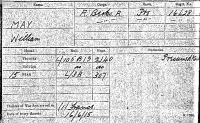
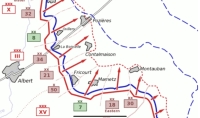 (Now back to the Berkshires)…..the No Man’s Land strip at Ovillers
was particularly wide at the slightly more northern position on the other side of the Albert-Bapaume Road which was occupied by the Berkshire lads, and was overlooked by German positions to the north. As the assault on these positions failed the Germans were free to fire across the 2nd Berkshires as they advanced. Despite this some of the Berkshires reached and captured a portion of the enemy front line. However, too few of them made it and it was impossible to follow up with the extra men and munitions that would have been needed to hold the position, which was, in any case, totally untenable as neither flank was covered by an equivalent advance by the battalions to left and right.
The battalion’s casualties were colossal.
(Now back to the Berkshires)…..the No Man’s Land strip at Ovillers
was particularly wide at the slightly more northern position on the other side of the Albert-Bapaume Road which was occupied by the Berkshire lads, and was overlooked by German positions to the north. As the assault on these positions failed the Germans were free to fire across the 2nd Berkshires as they advanced. Despite this some of the Berkshires reached and captured a portion of the enemy front line. However, too few of them made it and it was impossible to follow up with the extra men and munitions that would have been needed to hold the position, which was, in any case, totally untenable as neither flank was covered by an equivalent advance by the battalions to left and right.
The battalion’s casualties were colossal.


 War Diary, 2nd Battalion, Royal Berkshire Regiment
—1 July 1916 —
Attack on OVILLERS. The Battalion took up its assembly position in accordance with Brigade Operation Order No. 100. The 2nd Bn Lincolnshire Regt was on the left and the 2Bn Devonshire Regt on right. Our own wire was not sufficiently cut and parties were immediately sent out by Companies to clear it. At 6.25am the intensive bombardment began as scheduled. At about 7.15am the enemy opened rifle and machine gun fire on our line; this fire was probably drawn by the 2nd Devon Regt which at about this time attempted to line up in front of their parapet. At 7.20am Companies began filing down trenches and getting ready for the assault. At 7.30am the three assaulting Companies advanced to attack the German line. They were met by intense rifle and machine gun fire which prevented any of the waves reaching the enemy lines. A little group on the left of the Battalion succeeded in getting in, but were eventually bombed out.
At about 7.45am the commanding officer (Lt Col A.M. Holdsworth) and second in command (Major G.H. Sawyer DSO) were wounded in the sap on the left of our front, the commdg officer handed over Command of the Battalion to 2nd Lieut C. Mollet (Actg Adjt) by this time the parapet was swept by rifle and machine gun fire which prevented any exit from our trenches. The enemy replied to our intensive bombardment by barraging the front line from about 6.35am onwards. No message was received from other Battalions in immediate vicinity.
War Diary, 2nd Battalion, Royal Berkshire Regiment
—1 July 1916 —
Attack on OVILLERS. The Battalion took up its assembly position in accordance with Brigade Operation Order No. 100. The 2nd Bn Lincolnshire Regt was on the left and the 2Bn Devonshire Regt on right. Our own wire was not sufficiently cut and parties were immediately sent out by Companies to clear it. At 6.25am the intensive bombardment began as scheduled. At about 7.15am the enemy opened rifle and machine gun fire on our line; this fire was probably drawn by the 2nd Devon Regt which at about this time attempted to line up in front of their parapet. At 7.20am Companies began filing down trenches and getting ready for the assault. At 7.30am the three assaulting Companies advanced to attack the German line. They were met by intense rifle and machine gun fire which prevented any of the waves reaching the enemy lines. A little group on the left of the Battalion succeeded in getting in, but were eventually bombed out.
At about 7.45am the commanding officer (Lt Col A.M. Holdsworth) and second in command (Major G.H. Sawyer DSO) were wounded in the sap on the left of our front, the commdg officer handed over Command of the Battalion to 2nd Lieut C. Mollet (Actg Adjt) by this time the parapet was swept by rifle and machine gun fire which prevented any exit from our trenches. The enemy replied to our intensive bombardment by barraging the front line from about 6.35am onwards. No message was received from other Battalions in immediate vicinity.

 At about 11am the order came from Bde Headquarters to "stand by" and await further orders. About 200 men of the Battalion were collected on the right of the front line and in the assembly trenches off Ulverston Street. At about 12.30pm news was received that the Brigade would be relieved. At about 3pm Major Hon R. Brand, 2nd Rifle Brigade arranged to take over all the front line and with the sanction of the Brigade the Battalion was withdrawn to Ribble Street. On relief by the 37th Infantry Bde, the Battalion marched back to bivouac in Long Valley. Two Lewis Guns were damaged, Steel Helmets proved invaluable and in numberless cases saved mens lives.
At about 11am the order came from Bde Headquarters to "stand by" and await further orders. About 200 men of the Battalion were collected on the right of the front line and in the assembly trenches off Ulverston Street. At about 12.30pm news was received that the Brigade would be relieved. At about 3pm Major Hon R. Brand, 2nd Rifle Brigade arranged to take over all the front line and with the sanction of the Brigade the Battalion was withdrawn to Ribble Street. On relief by the 37th Infantry Bde, the Battalion marched back to bivouac in Long Valley. Two Lewis Guns were damaged, Steel Helmets proved invaluable and in numberless cases saved mens lives.
 Other Ranks Casualties:
33 Killed, 3 Died Of Wounds, 260 Wounded, 118 Missing.
William was among the missing. In the circumstances of the assault it was relatively unlikely that a man would be taken prisoner, the odds were that a man reported missing was lying out in No Mans’ Land, or had been blown to unidentifiable bits by a shell.
In all, 148 ‘other ranks’ of 2nd Berkshire Regt are recorded by the Commonwealth War Graves Commission as having died that day – only six of the missing men ever turned up.
All the missing officers were later confirmed dead – as was William May who along with 147 of his “other ranks” comrades is remembered with eternal honour on:
THE THIEPVAL MEMORIAL
Pier and Face 11 D. Somme, France.
Other Ranks Casualties:
33 Killed, 3 Died Of Wounds, 260 Wounded, 118 Missing.
William was among the missing. In the circumstances of the assault it was relatively unlikely that a man would be taken prisoner, the odds were that a man reported missing was lying out in No Mans’ Land, or had been blown to unidentifiable bits by a shell.
In all, 148 ‘other ranks’ of 2nd Berkshire Regt are recorded by the Commonwealth War Graves Commission as having died that day – only six of the missing men ever turned up.
All the missing officers were later confirmed dead – as was William May who along with 147 of his “other ranks” comrades is remembered with eternal honour on:
THE THIEPVAL MEMORIAL
Pier and Face 11 D. Somme, France.




 An Exceptional and Seldom Seen, Fully Complete 1st JULY 1916 Casualty Trio, Plaque and Scroll Grouping. All medals, plaque & ribbons are mint.
Scroll is mounted on card in a matt ready for framing.
£1350
With quality part-exchanges welcome.
An Exceptional and Seldom Seen, Fully Complete 1st JULY 1916 Casualty Trio, Plaque and Scroll Grouping. All medals, plaque & ribbons are mint.
Scroll is mounted on card in a matt ready for framing.
£1350
With quality part-exchanges welcome.
 William May was the Son of Henry and Mary Ann May & Husband of Mary Ann May, of 22, Spring Grove, Reading. The address still exists.
At the outbreak of war in August 1914 the regular 2nd Battalion of Royal Berkshires was in Jhansi, India, and returned to England, landing on 22nd October 1914 when they moved to Winchester and were placed under command of 25th Brigade in 8th Division.
The unit then shipped to France and landed at Le Havre on 5th November 1914. William May was born in 1885 and joined 2nd Berks Regt as a Kitchener’s volunteer at age 29 in the early months of the war and after his initial training joined the newly returned regulars of 2nd Bn in France in the summer period of 1915.
William May was the Son of Henry and Mary Ann May & Husband of Mary Ann May, of 22, Spring Grove, Reading. The address still exists.
At the outbreak of war in August 1914 the regular 2nd Battalion of Royal Berkshires was in Jhansi, India, and returned to England, landing on 22nd October 1914 when they moved to Winchester and were placed under command of 25th Brigade in 8th Division.
The unit then shipped to France and landed at Le Havre on 5th November 1914. William May was born in 1885 and joined 2nd Berks Regt as a Kitchener’s volunteer at age 29 in the early months of the war and after his initial training joined the newly returned regulars of 2nd Bn in France in the summer period of 1915.
 [2nd Bn BERKSHIRE REGIMENT on 1st JULY 1916]
-The First Day of The Battle of The Somme-
(Ovillers-la-Boiselle)
On Saturday 1st July 1916 the 2nd Battalion found themselves in a trench near the French town of Albert.
At 7:30am three companies of the battalion left the trench to advance on German held positions a few hundred metres away around the little village of Ovillers-la-Boiselle - the Battle of the Somme had begun.
The German positions to be attacked were in front of the village of Ovillers, which was just off the northern side of the Albert to Bapaume road, which is just a stones throw across the road from La Boiselle itself.
At 7:28 a.m. the Royal Engineers detonated their four mines at La Boisselle, the two largest being the one at Y-Sap and the now famous Lochnagar crater mine. No less than 15 other mines were fired along other sectors of the front line. The explosion of the Lochnagar mine obliterated 300–400 feet of German fortifications, including nine dug-outs and apparently vaporised several hundred men inside them as there were few remains.
Most of the 5th Company of Reserve Infantry Regiment 110 and the trenches nearby were destroyed. The Lochnagar mine lay on the sector assaulted by the Grimsby Chums, 10th Battalion, The Lincolnshire Regiment.
[2nd Bn BERKSHIRE REGIMENT on 1st JULY 1916]
-The First Day of The Battle of The Somme-
(Ovillers-la-Boiselle)
On Saturday 1st July 1916 the 2nd Battalion found themselves in a trench near the French town of Albert.
At 7:30am three companies of the battalion left the trench to advance on German held positions a few hundred metres away around the little village of Ovillers-la-Boiselle - the Battle of the Somme had begun.
The German positions to be attacked were in front of the village of Ovillers, which was just off the northern side of the Albert to Bapaume road, which is just a stones throw across the road from La Boiselle itself.
At 7:28 a.m. the Royal Engineers detonated their four mines at La Boisselle, the two largest being the one at Y-Sap and the now famous Lochnagar crater mine. No less than 15 other mines were fired along other sectors of the front line. The explosion of the Lochnagar mine obliterated 300–400 feet of German fortifications, including nine dug-outs and apparently vaporised several hundred men inside them as there were few remains.
Most of the 5th Company of Reserve Infantry Regiment 110 and the trenches nearby were destroyed. The Lochnagar mine lay on the sector assaulted by the Grimsby Chums, 10th Battalion, The Lincolnshire Regiment.
 The main attack began at Zero Hour, 07:30am on the Saturday morning, but being so very close to the Lochnagar mine explosion site, (*less than 250 yards across away across no man’s land and what was and is now again a potato field.) the Grimsby Chums were delayed. This delay was for just a few minutes in order to let the huge amount of expelled soil & chalk debris from the massive explosion to settle.
Some of The Chums didn’t make it much further than a few yards from their trench before being savagely cut down by enfilading machine gun & rifle fire in no man’s land, ….but a few of the lads managed to occupy positions on the newly formed rim of the crater and began to fortify its eastern lip. This position dominated the vicinity and the Chum’s advance continued to the Grüne Stellung (second position), where it was stopped by the German 4th Company, which then counter-attacked and forced the British men back to the crater.
[NOTE]
My own great uncle 1107 Pte John William Camplin of 10th Lincoln’s, The Grimsby Chums, was Killed in Action at La Boisselle on 1st July 1916 and was seen shot dead with his best mate Pte Harold Cammack by the telegraphic linesmen as they rolled out the new phone cables. They were both laying right by the lip of the crater.
Their bodies were never recovered and both are commemorated on the THIEPVAL Memorial to the missing of The Somme.
My Great Uncle John was just 21 and from Sleaford, Lincolnshire.
The main attack began at Zero Hour, 07:30am on the Saturday morning, but being so very close to the Lochnagar mine explosion site, (*less than 250 yards across away across no man’s land and what was and is now again a potato field.) the Grimsby Chums were delayed. This delay was for just a few minutes in order to let the huge amount of expelled soil & chalk debris from the massive explosion to settle.
Some of The Chums didn’t make it much further than a few yards from their trench before being savagely cut down by enfilading machine gun & rifle fire in no man’s land, ….but a few of the lads managed to occupy positions on the newly formed rim of the crater and began to fortify its eastern lip. This position dominated the vicinity and the Chum’s advance continued to the Grüne Stellung (second position), where it was stopped by the German 4th Company, which then counter-attacked and forced the British men back to the crater.
[NOTE]
My own great uncle 1107 Pte John William Camplin of 10th Lincoln’s, The Grimsby Chums, was Killed in Action at La Boisselle on 1st July 1916 and was seen shot dead with his best mate Pte Harold Cammack by the telegraphic linesmen as they rolled out the new phone cables. They were both laying right by the lip of the crater.
Their bodies were never recovered and both are commemorated on the THIEPVAL Memorial to the missing of The Somme.
My Great Uncle John was just 21 and from Sleaford, Lincolnshire.

 (Now back to the Berkshires)…..the No Man’s Land strip at Ovillers
was particularly wide at the slightly more northern position on the other side of the Albert-Bapaume Road which was occupied by the Berkshire lads, and was overlooked by German positions to the north. As the assault on these positions failed the Germans were free to fire across the 2nd Berkshires as they advanced. Despite this some of the Berkshires reached and captured a portion of the enemy front line. However, too few of them made it and it was impossible to follow up with the extra men and munitions that would have been needed to hold the position, which was, in any case, totally untenable as neither flank was covered by an equivalent advance by the battalions to left and right.
The battalion’s casualties were colossal.
(Now back to the Berkshires)…..the No Man’s Land strip at Ovillers
was particularly wide at the slightly more northern position on the other side of the Albert-Bapaume Road which was occupied by the Berkshire lads, and was overlooked by German positions to the north. As the assault on these positions failed the Germans were free to fire across the 2nd Berkshires as they advanced. Despite this some of the Berkshires reached and captured a portion of the enemy front line. However, too few of them made it and it was impossible to follow up with the extra men and munitions that would have been needed to hold the position, which was, in any case, totally untenable as neither flank was covered by an equivalent advance by the battalions to left and right.
The battalion’s casualties were colossal.


 War Diary, 2nd Battalion, Royal Berkshire Regiment
—1 July 1916 —
Attack on OVILLERS. The Battalion took up its assembly position in accordance with Brigade Operation Order No. 100. The 2nd Bn Lincolnshire Regt was on the left and the 2Bn Devonshire Regt on right. Our own wire was not sufficiently cut and parties were immediately sent out by Companies to clear it. At 6.25am the intensive bombardment began as scheduled. At about 7.15am the enemy opened rifle and machine gun fire on our line; this fire was probably drawn by the 2nd Devon Regt which at about this time attempted to line up in front of their parapet. At 7.20am Companies began filing down trenches and getting ready for the assault. At 7.30am the three assaulting Companies advanced to attack the German line. They were met by intense rifle and machine gun fire which prevented any of the waves reaching the enemy lines. A little group on the left of the Battalion succeeded in getting in, but were eventually bombed out.
At about 7.45am the commanding officer (Lt Col A.M. Holdsworth) and second in command (Major G.H. Sawyer DSO) were wounded in the sap on the left of our front, the commdg officer handed over Command of the Battalion to 2nd Lieut C. Mollet (Actg Adjt) by this time the parapet was swept by rifle and machine gun fire which prevented any exit from our trenches. The enemy replied to our intensive bombardment by barraging the front line from about 6.35am onwards. No message was received from other Battalions in immediate vicinity.
War Diary, 2nd Battalion, Royal Berkshire Regiment
—1 July 1916 —
Attack on OVILLERS. The Battalion took up its assembly position in accordance with Brigade Operation Order No. 100. The 2nd Bn Lincolnshire Regt was on the left and the 2Bn Devonshire Regt on right. Our own wire was not sufficiently cut and parties were immediately sent out by Companies to clear it. At 6.25am the intensive bombardment began as scheduled. At about 7.15am the enemy opened rifle and machine gun fire on our line; this fire was probably drawn by the 2nd Devon Regt which at about this time attempted to line up in front of their parapet. At 7.20am Companies began filing down trenches and getting ready for the assault. At 7.30am the three assaulting Companies advanced to attack the German line. They were met by intense rifle and machine gun fire which prevented any of the waves reaching the enemy lines. A little group on the left of the Battalion succeeded in getting in, but were eventually bombed out.
At about 7.45am the commanding officer (Lt Col A.M. Holdsworth) and second in command (Major G.H. Sawyer DSO) were wounded in the sap on the left of our front, the commdg officer handed over Command of the Battalion to 2nd Lieut C. Mollet (Actg Adjt) by this time the parapet was swept by rifle and machine gun fire which prevented any exit from our trenches. The enemy replied to our intensive bombardment by barraging the front line from about 6.35am onwards. No message was received from other Battalions in immediate vicinity.

 At about 11am the order came from Bde Headquarters to "stand by" and await further orders. About 200 men of the Battalion were collected on the right of the front line and in the assembly trenches off Ulverston Street. At about 12.30pm news was received that the Brigade would be relieved. At about 3pm Major Hon R. Brand, 2nd Rifle Brigade arranged to take over all the front line and with the sanction of the Brigade the Battalion was withdrawn to Ribble Street. On relief by the 37th Infantry Bde, the Battalion marched back to bivouac in Long Valley. Two Lewis Guns were damaged, Steel Helmets proved invaluable and in numberless cases saved mens lives.
At about 11am the order came from Bde Headquarters to "stand by" and await further orders. About 200 men of the Battalion were collected on the right of the front line and in the assembly trenches off Ulverston Street. At about 12.30pm news was received that the Brigade would be relieved. At about 3pm Major Hon R. Brand, 2nd Rifle Brigade arranged to take over all the front line and with the sanction of the Brigade the Battalion was withdrawn to Ribble Street. On relief by the 37th Infantry Bde, the Battalion marched back to bivouac in Long Valley. Two Lewis Guns were damaged, Steel Helmets proved invaluable and in numberless cases saved mens lives.
 Other Ranks Casualties:
33 Killed, 3 Died Of Wounds, 260 Wounded, 118 Missing.
William was among the missing. In the circumstances of the assault it was relatively unlikely that a man would be taken prisoner, the odds were that a man reported missing was lying out in No Mans’ Land, or had been blown to unidentifiable bits by a shell.
In all, 148 ‘other ranks’ of 2nd Berkshire Regt are recorded by the Commonwealth War Graves Commission as having died that day – only six of the missing men ever turned up.
All the missing officers were later confirmed dead – as was William May who along with 147 of his “other ranks” comrades is remembered with eternal honour on:
THE THIEPVAL MEMORIAL
Pier and Face 11 D. Somme, France.
Other Ranks Casualties:
33 Killed, 3 Died Of Wounds, 260 Wounded, 118 Missing.
William was among the missing. In the circumstances of the assault it was relatively unlikely that a man would be taken prisoner, the odds were that a man reported missing was lying out in No Mans’ Land, or had been blown to unidentifiable bits by a shell.
In all, 148 ‘other ranks’ of 2nd Berkshire Regt are recorded by the Commonwealth War Graves Commission as having died that day – only six of the missing men ever turned up.
All the missing officers were later confirmed dead – as was William May who along with 147 of his “other ranks” comrades is remembered with eternal honour on:
THE THIEPVAL MEMORIAL
Pier and Face 11 D. Somme, France.




 An Exceptional and Seldom Seen, Fully Complete 1st JULY 1916 Casualty Trio, Plaque and Scroll Grouping. All medals, plaque & ribbons are mint.
Scroll is mounted on card in a matt ready for framing.
£1350
With quality part-exchanges welcome.
An Exceptional and Seldom Seen, Fully Complete 1st JULY 1916 Casualty Trio, Plaque and Scroll Grouping. All medals, plaque & ribbons are mint.
Scroll is mounted on card in a matt ready for framing.
£1350
With quality part-exchanges welcome.